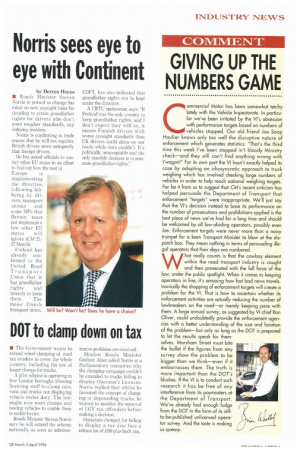C ommercial Motor has been somewhat tetchy lately with the Vehicle
Page 7

If you've noticed an error in this article please click here to report it so we can fix it.
Inspectorate. In particular we've been irritated by the VI's obsession with performance targets based on numbers of vehicles stopped. Our old friend Joe Soap Haulier knows only too well the disruptive nature of enforcement which generates statistics: "That's the third time this week I've been stopped in't bloody Ministry check—and they still can't find anything wrong with trwagonl" For its own part the VI hasn't exactly helped its case by adopting an idiosyncratic approach to truck weighing which has involved checking large numbers of vehicles in order to help reach national weighing targets. Far be it from us to suggest that CM's recent criticism has helped persuade the Department of Transport that enforcement "targets" were inappropriate. We'll just say that the VI's decision instead to base its performance on the number of prosecutions and prohibitions applied is the best piece of news we've had for a long time and should be welcomed by all law-abiding operators, possibly even Joe. Enforcement targets were never more than a noisy trumpet for a keen Transport Minister to blow at the dispatch box. They mean nothing in terms of persuading illegal operators that their days are numbered.
What really counts is that the cowboy element within the road transport industry is caught and then prosecuted with the full force of the law, under the public spotlight. When it comes to keeping operators in line, it's amazing how fast bad news travels. Ironically the dropping of enforcement targets will create a problem for the VI. That is how to ascertain whether its enforcement activities are actually reducing the number of lawbreakers on the road—or merely keeping pace with them. A large annual survey, as suggested by VI chief Ron Oliver, could undoubtedly provide the enforcement agencies with a better understanding of the size and location of the problem—but only as long as the DOT is prepared to let the results speak for themselves. Marsham Street must bite the bullet if the figures from any survey show the problem to be bigger than we think—even if it embarrasses them. The truth is more important than the DOT's blushes. If the VI is to conduct such research it has be free of any interference from its paymasters at the Department of Transport. We've already had enough fudge from the DOT in the form of its stillto-be-published unlicensed operator survey. And the taste is making us queasy.




































































































